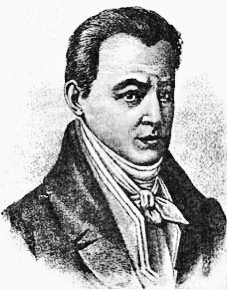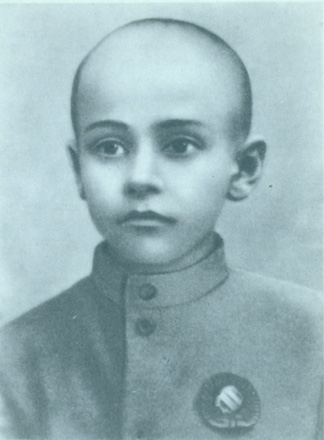|
Klym Polishchuk
Klym Lavrynovych Polishchuk ( uk, Клим Лаврентійович Поліщук, 25 November 1891, Krasnopil, Zhytomyr region, Ukraine – 3 November 1937, Sandarmokh, Russia) was a Ukrainian journalist, poet and writer. Biography Klym Polishchuk was born into a peasant family. As a child he was home-schooled, along with his brother Fedir and sister Nastia, by their father. At a young age Klym was forced to work as a hired worker. In addition to being interested in literature, Klym Polishchuk was a skilled artist. In 1909, with the support of the Hromada benevolent organisation and a few individuals, Klym Polishchuk enrolled at the Art Drawing College, Art Academy, St Petersburg, Russia. In 1912, due to a lack of funds, Polishchuk withdrew from the college and returned to Zhytomyr. In August 1914 Klym Polishchuk was arrested for "separatism" activities and exiled to Russia. In 1916 he was deployed to fight in World War I. In 1920 Klym Polishchuk moved to Lviv, where in 19 ... [...More Info...] [...Related Items...] OR: [Wikipedia] [Google] [Baidu] |
Valerian Polishchuk
Valerian Lvovych Polishchuk ( uk, Валеріан Львович Поліщук, 1 October 1897 — 9 October 1937) was a Ukrainian writer and poet, a representative of the Executed Renaissance. He wrote in Ukrainian. Polishchuk was born in the village of Bilche, currently in Rivne Oblast of Ukraine. He studied in Lutsk and later in Yekaterinoslav, graduating from high school in 1917. Since 1917, he was living in Kiev and Yekaterinoslav, writing for various newspapers. During the Russian Civil War, Polishchuk supported the Ukrainian People's Republic. Polishchuk has been writing poetry since 1914. In 1919 he published his first poem ''The Old Tale on How Olga Burned Korosten'' (''Сказання давнєє про те, як Ольга Коростень спалила''). In 1920, he already published three books of poetry. In 1921, Polishchuk moved to Kharkiv, where he was actively involved with various literature activities. In 1923, he joined HART, which also featured, a ... [...More Info...] [...Related Items...] OR: [Wikipedia] [Google] [Baidu] |
Great Purge Victims From Ukraine
Great may refer to: Descriptions or measurements * Great, a relative measurement in physical space, see Size * Greatness, being divine, majestic, superior, majestic, or transcendent People * List of people known as "the Great" *Artel Great (born 1981), American actor Other uses * ''Great'' (1975 film), a British animated short about Isambard Kingdom Brunel * ''Great'' (2013 film), a German short film * Great (supermarket), a supermarket in Hong Kong * GReAT, Graph Rewriting and Transformation, a Model Transformation Language * Gang Resistance Education and Training Gang Resistance Education And Training, abbreviated G.R.E.A.T., provides a school-based, police officer instructed program that includes classroom instruction and various learning activities. Their intention is to teach the students to avoid gan ..., or GREAT, a school-based and police officer-instructed program * Global Research and Analysis Team (GReAT), a cybersecurity team at Kaspersky Lab *'' Great!'', a 20 ... [...More Info...] [...Related Items...] OR: [Wikipedia] [Google] [Baidu] |
Ukrainian Male Writers
Ukrainian may refer to: * Something of, from, or related to Ukraine * Something relating to Ukrainians, an East Slavic people from Eastern Europe * Something relating to demographics of Ukraine in terms of demography and population of Ukraine * Something relating to Ukrainian culture * Ukrainian language, an East Slavic language, the native language of Ukrainians and the official state language of Ukraine * Ukrainian alphabet, a Ukrainian form of Cyrillic alphabet * Ukrainian cuisine See also * Languages of Ukraine * Name of Ukraine * Ukrainian Orthodox Church (other) * Ukrainians (other) * Ukraine (other) * Ukraina (other) * Ukrainia (other) Ukrainia may refer to: * The land of Ukraine, the land of the Kievan Rus * The land of the Ukrainians, an ethnic territory * Montreal ''Ukrainia'', a sports team in Canada * Toronto ''Ukrainia'', a sports team in Canada See also * * Ukraina ... * {{disambiguation Language and nationality ... [...More Info...] [...Related Items...] OR: [Wikipedia] [Google] [Baidu] |
Gothic Fiction
Gothic fiction, sometimes called Gothic horror in the 20th century, is a loose literary aesthetic of fear and haunting. The name is a reference to Gothic architecture of the European Middle Ages, which was characteristic of the settings of early Gothic novels. The first work to call itself Gothic was Horace Walpole's 1764 novel ''The Castle of Otranto'', later subtitled "A Gothic Story". Subsequent 18th century contributors included Clara Reeve, Ann Radcliffe, William Beckford (novelist), William Thomas Beckford, and Matthew Gregory Lewis, Matthew Lewis. The Gothic influence continued into the early 19th century, works by the Romantic poetry, Romantic poets, and novelists such as Mary Shelley, Charles Maturin, Walter Scott and E. T. A. Hoffmann frequently drew upon gothic motifs in their works. The early Victorian literature, Victorian period continued the use of gothic, in novels by Charles Dickens and the Brontë family, Brontë sisters, as well as works by the American ... [...More Info...] [...Related Items...] OR: [Wikipedia] [Google] [Baidu] |
Symbolism (arts)
Symbolism was a late 19th-century art movement of French art, French and Art of Belgium, Belgian origin in poetry and other arts seeking to represent absolute truths symbolically through language and metaphorical images, mainly as a reaction against Naturalism (literature), naturalism and Realism (arts), realism. In literature, the style originates with the 1857 publication of Charles Baudelaire's ''Les Fleurs du mal''. The works of Edgar Allan Poe, which Baudelaire admired greatly and translated into French, were a significant influence and the source of many stock Trope (literature), tropes and images. The aesthetic was developed by Stéphane Mallarmé and Paul Verlaine during the 1860s and 1870s. In the 1880s, the aesthetic was articulated by a series of manifestos and attracted a generation of writers. The term "symbolist" was first applied by the critic Jean Moréas, who invented the term to distinguish the Symbolists from the related decadent movement, Decadents of literat ... [...More Info...] [...Related Items...] OR: [Wikipedia] [Google] [Baidu] |
Writing Style
In literature, writing style is the manner of expressing thought in language characteristic of an individual, period, school, or nation. As Bryan Ray notes, however, style is a broader concern, one that can describe "readers' relationships with, texts, the grammatical choices writers make, the importance of adhering to norms in certain contexts and deviating from them in others, the expression of social identity, and the emotional effects of particular devices on audiences." Thus, style is a term that may refer, at one and the same time, to singular aspects of an individual's writing habits or a particular document and to aspects that go well-beyond the individual writer. Beyond the essential elements of spelling, grammar, and punctuation, writing style is the choice of words, sentence structure, and paragraph structure, used to convey the meaning effectively. The former are referred to as ''rules'', ''elements'', ''essentials'', ''mechanics'', or ''handbook''; the latter are ref ... [...More Info...] [...Related Items...] OR: [Wikipedia] [Google] [Baidu] |
October Revolution
The October Revolution,. officially known as the Great October Socialist Revolution. in the Soviet Union, also known as the Bolshevik Revolution, was a revolution in Russia led by the Bolshevik Party of Vladimir Lenin that was a key moment in the larger Russian Revolution of 1917–1923. It was the second revolutionary change of government in Russia in 1917. It took place through an armed insurrection in Petrograd (now Saint Petersburg) on . It was the precipitating event of the Russian Civil War. The October Revolution followed and capitalized on the February Revolution earlier that year, which had overthrown the Tsarist autocracy, resulting in a liberal provisional government. The provisional government had taken power after being proclaimed by Grand Duke Michael, Tsar Nicholas II's younger brother, who declined to take power after the Tsar stepped down. During this time, urban workers began to organize into councils (soviets) wherein revolutionaries criticized the pro ... [...More Info...] [...Related Items...] OR: [Wikipedia] [Google] [Baidu] |
Ukrainian Literature
Ukrainian literature is literature written in the Ukrainian language. Ukrainian literature mostly developed under foreign domination over Ukrainian territories, foreign rule by the Polish–Lithuanian Commonwealth, Poland, the Russian Empire, the Kingdom of Romania, the Austria-Hungary Empire, and the Ottoman Empire, enriched Ukrainian culture and language, and Ukrainian authors were able to produce a rich literary heritage. Ukrainian literature’s precursor: writings in Old-Church Slavonic and Latin in Ukraine Prior to the establishment of Ukrainian literature in 1700s, many authors from Ukraine wrote in "scholarly" languages of middle-ages – Latin and Old-Church Slavonic. Among prominent authors from Ukraine who wrote in Latin and Old-Church Slavonic are Hryhorii Skovoroda, Yuriy Drohobych, Stanislav Orikhovsky-Roxolan, Feofan Prokopovych, , and others. The beginnings of oral Ukrainian literature During this period of history there was a higher number of elementa ... [...More Info...] [...Related Items...] OR: [Wikipedia] [Google] [Baidu] |
Pavlo Tychyna
Pavlo Hryhorovych Tychyna ( uk, Павло Григорович Тичина; – September 16, 1967) was a major Ukrainian poet, translator, publicist, public activist, academician, and statesman. He composed the lyrics to the Anthem of the Ukrainian Soviet Socialist Republic. Life Born in Pisky in 1891, he was baptized on January 27, which was mistakenly considered his birth date until recently. His father, Hryhoriy Timofiyovych Tychynin, was a village deacon and a teacher in the local grammar school. His mother, Maria Vasylivna Tychynina (Savytska), was eleven years younger than Pavlo's father. Pavlo had nine siblings: five sisters and four brothers. At first young Tychyna studied at the district's elementary school which was opened in Pisky in 1897. His first teacher was Serafima Morachevska who later recommended him to try his talent in chorus. In 1900 he became a member of an archiary chorus in the Trinity (Troitsky) monastery near Chernihiv. Simultaneously young Tychyna ... [...More Info...] [...Related Items...] OR: [Wikipedia] [Google] [Baidu] |
Karelia
Karelia ( Karelian and fi, Karjala, ; rus, Каре́лия, links=y, r=Karélija, p=kɐˈrʲelʲɪjə, historically ''Korjela''; sv, Karelen), the land of the Karelian people, is an area in Northern Europe of historical significance for Russia (including the Soviet era), Finland, and Sweden. It is currently divided between northwestern Russia (specifically the federal subjects of the Republic of Karelia and Leningrad Oblast) and Finland (the regions of South Karelia, North Karelia, and the eastern portion of modern-day Kymenlaakso). Use of name Various subdivisions may be called Karelia. Finnish Karelia was a historical province of Finland, and is now divided between Finland and Russia, often called just ''Karjala'' in Finnish. The eastern part of this chiefly Lutheran area was ceded to Russia after the Winter War of 1939–40. The Republic of Karelia is a Russian federal subject, including East Karelia with a chiefly Russian Orthodox population. Within present-da ... [...More Info...] [...Related Items...] OR: [Wikipedia] [Google] [Baidu] |







